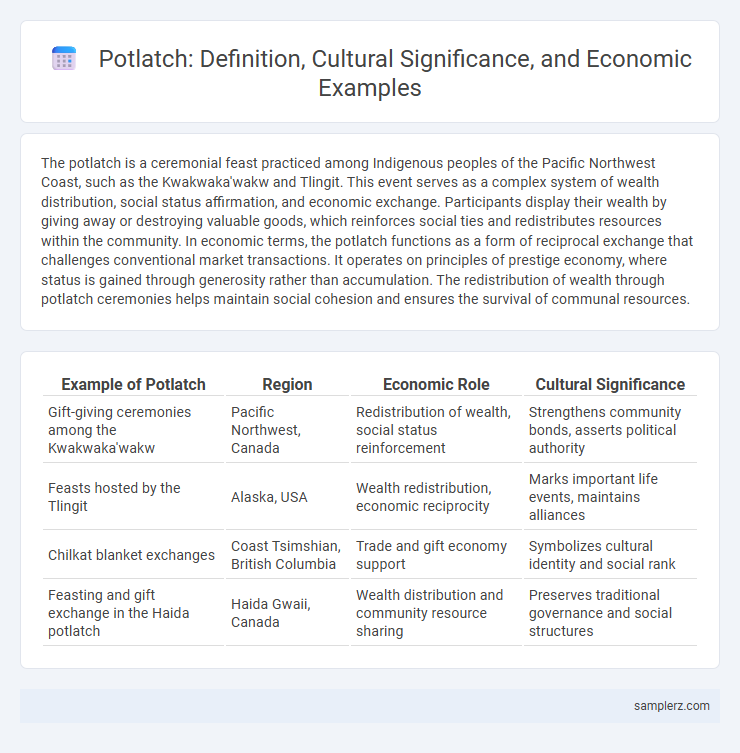The potlatch is a ceremonial feast practiced among Indigenous peoples of the Pacific Northwest Coast, such as the Kwakwaka'wakw and Tlingit. This event serves as a complex system of wealth distribution, social status affirmation, and economic exchange. Participants display their wealth by giving away or destroying valuable goods, which reinforces social ties and redistributes resources within the community. In economic terms, the potlatch functions as a form of reciprocal exchange that challenges conventional market transactions. It operates on principles of prestige economy, where status is gained through generosity rather than accumulation. The redistribution of wealth through potlatch ceremonies helps maintain social cohesion and ensures the survival of communal resources.
Table of Comparison
| Example of Potlatch | Region | Economic Role | Cultural Significance |
|---|---|---|---|
| Gift-giving ceremonies among the Kwakwaka'wakw | Pacific Northwest, Canada | Redistribution of wealth, social status reinforcement | Strengthens community bonds, asserts political authority |
| Feasts hosted by the Tlingit | Alaska, USA | Wealth redistribution, economic reciprocity | Marks important life events, maintains alliances |
| Chilkat blanket exchanges | Coast Tsimshian, British Columbia | Trade and gift economy support | Symbolizes cultural identity and social rank |
| Feasting and gift exchange in the Haida potlatch | Haida Gwaii, Canada | Wealth distribution and community resource sharing | Preserves traditional governance and social structures |
Historical Overview of Potlatch in Indigenous Cultures
Potlatch, a ceremonial feast practiced by Indigenous peoples of the Pacific Northwest, historically functioned as a complex economic system involving wealth redistribution, social status reinforcement, and resource management. This tradition emphasized the giving and reciprocating of gifts, which ensured community cohesion and economic balance among tribes such as the Kwakwaka'wakw and Tlingit. Colonial laws once banned potlatch ceremonies, disrupting Indigenous economic practices until their revival affirmed cultural identity and economic resilience.
Potlatch as an Economic Redistribution System
Potlatch functions as a traditional economic redistribution system among Indigenous communities of the Pacific Northwest, where wealth is accumulated and then ceremonially distributed to reinforce social status and communal bonds. This practice involves the gifting of resources such as food, blankets, and tools, promoting reciprocity and social cohesion through the controlled flow of goods and wealth. Understanding potlatch reveals how non-market economies can sustain social equity by prioritizing collective welfare over individual accumulation.
Gift Giving: The Core Practice of Potlatch
Potlatch exemplifies Gift Giving as a central economic and cultural practice among Indigenous Northwest Coast peoples, where leaders distribute wealth to assert social status and reinforce community bonds. This ceremonial exchange redistributes goods like blankets, food, and copper, fostering reciprocity and social cohesion. The potlatch economy challenges Western capitalist models by emphasizing generosity and obligation over accumulation and profit.
Potlatch Ceremonies and Their Socioeconomic Roles
Potlatch ceremonies among Indigenous peoples of the Pacific Northwest serve as vital economic institutions that redistribute wealth and reinforce social status. These elaborate gatherings involve the ceremonial giving away or destruction of valuable goods, which strengthens community bonds and asserts the host's prestige and leadership. The socioeconomic role of potlatch includes supporting reciprocal exchange systems, regulating resource distribution, and preserving cultural identity within complex indigenous economies.
Wealth Status and Social Prestige in Potlatch
Potlatch ceremonies serve as a critical mechanism for redistributing wealth and reinforcing social hierarchies within Indigenous economies, particularly among Pacific Northwest Coast tribes. The host's status is elevated through the lavish giving of gifts, which demonstrates both the abundance of resources and the ability to confer prestige. Wealth is not accumulated privately but displayed and dispersed publicly, linking material generosity directly to social influence and community standing.
Potlatch: Challenging Western Economic Concepts
Potlatch exemplifies an economic system where wealth redistribution defies Western capitalist norms by emphasizing community bonding and social status over individual accumulation. This Indigenous ceremonial feast involves the outward giving of gifts, which redistributes resources and reinforces social ties, contrasting the Western focus on profit maximization. Anthropologists highlight potlatch as a dynamic practice that challenges prevailing economic theories by prioritizing reciprocity and collective well-being.
Modern Interpretations of Potlatch in Contemporary Economies
Modern interpretations of potlatch in contemporary economies emphasize reciprocal gifting and social capital as alternatives to monetary exchange, fostering community cohesion and trust. Companies and social enterprises increasingly adopt potlatch principles to promote collaborative consumption and resource sharing, enhancing sustainable economic practices. This cultural adaptation challenges traditional capitalist models by valuing relational wealth over individual accumulation.
Case Study: The Kwakwaka’wakw Potlatch Economy
The Kwakwaka'wakw potlatch economy exemplifies a complex system of wealth redistribution and social status reinforcement among Indigenous communities in the Pacific Northwest. These ceremonial gift-giving events facilitate economic exchange and political alliances by redistributing goods such as blankets, copper shields, and food, reinforcing community bonds and social hierarchies. This practice challenges Western notions of capitalism by prioritizing reciprocity and collective wealth over individual accumulation.
Potlatch, Reciprocity, and Communal Wealth
Potlatch ceremonies exemplify a unique economic system rooted in reciprocity, where wealth is redistributed rather than accumulated individually, reinforcing social bonds and communal status among Indigenous peoples of the Pacific Northwest. This practice involves the host generously giving away or destroying wealth to assert social rank and maintain the balance of communal wealth. Potlatch challenges conventional market economies by prioritizing social obligation and collective prosperity over individual profit.
The Legacy of Potlatch in Economic Anthropology
The potlatch ceremony, practiced by Indigenous peoples of the Pacific Northwest, serves as a foundational example in economic anthropology for understanding reciprocal gift economies and wealth redistribution. This system challenges conventional market-based models by emphasizing social status and community cohesion over individual profit. Its legacy informs modern discussions on alternative economic systems that integrate cultural values and collective well-being.

example of potlatch in economy Infographic
 samplerz.com
samplerz.com